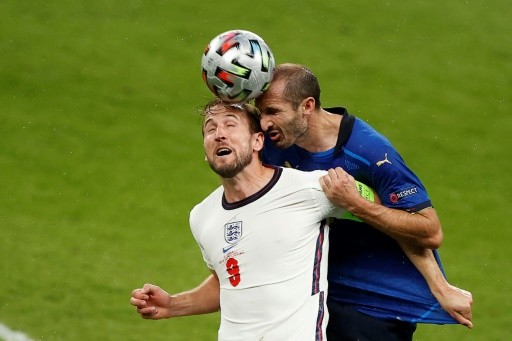Soccer defenders more at risk of dementia in later life says new research

Defenders are more likely than their teammates to suffer dementia caused by heading the ball, according to new research into the neurological disease in former players.
The latest data from the University of Glasgow's study has been labeled the "missing link" between soccer and the risk of degenerative brain disorders.
Results show for goalkeepers neurodegenerative disease risk was similar to general population levels but almost four times higher for outfield players, with a five-fold increase for defenders, where head injuries and heading the ball are more prevalent.
Findings also show diagnoses grew with increasing career length, ranging from an approximate doubling of risk in those with shortest careers, to around a five-time increase in those with the longest careers.
"We are at a point in this current data to suggest that footballs should be sold with a health warning saying 'Repeated heading of a football may lead to an increased risk of dementia'," said consultant neuropathologist Professor Willie Stewart of the University of Glasgow.
"Unlike other dementia and other degenerative diseases, we know what the risk factor is here. It is entirely preventable. We can stop this now, potentially. To do that we need to reduce - if not eliminate - unnecessary head impacts in sport. Is heading absolutely necessary for football to continue?
"Or, to put it another way, is exposure to dementia absolutely required for the game of football or can some other form of the game be considered? If we make a change now it will take 30 to 40 years to actually see the effects of that."
Researchers looked at health records data for around 8,000 Scottish former professional footballers and 23,000 matched general population controls and explored whether risk of neurodegenerative disease varied by player position, length of career or playing era.
The results add to ground-breaking observations from the 2019 study, which found former players had an approximately three-and-a-half-fold higher rate of death due to neurodegenerative disease than expected.
"Maybe football needs to consider other different forms of football," Stewart said.
"Do we wait 30 to 40 years or do we say now the evidence is sufficiently strong that we should consider the sport with unnecessary head impact? I think we are well past that point."
Stewart added footballs sold in shops should now come with a warning about the risks of dementia.
"I think footballs should be sold with a health warning saying repeated heading in football may lead to increased risks of dementia," he said. "I've yet to see any evidence that heading a ball is good for you. Football is great for you, there is less cancer and cardiovascular problems for players, but there are dreadful levels of dementia and I can't see the benefit of that."
Source: japantoday.com
